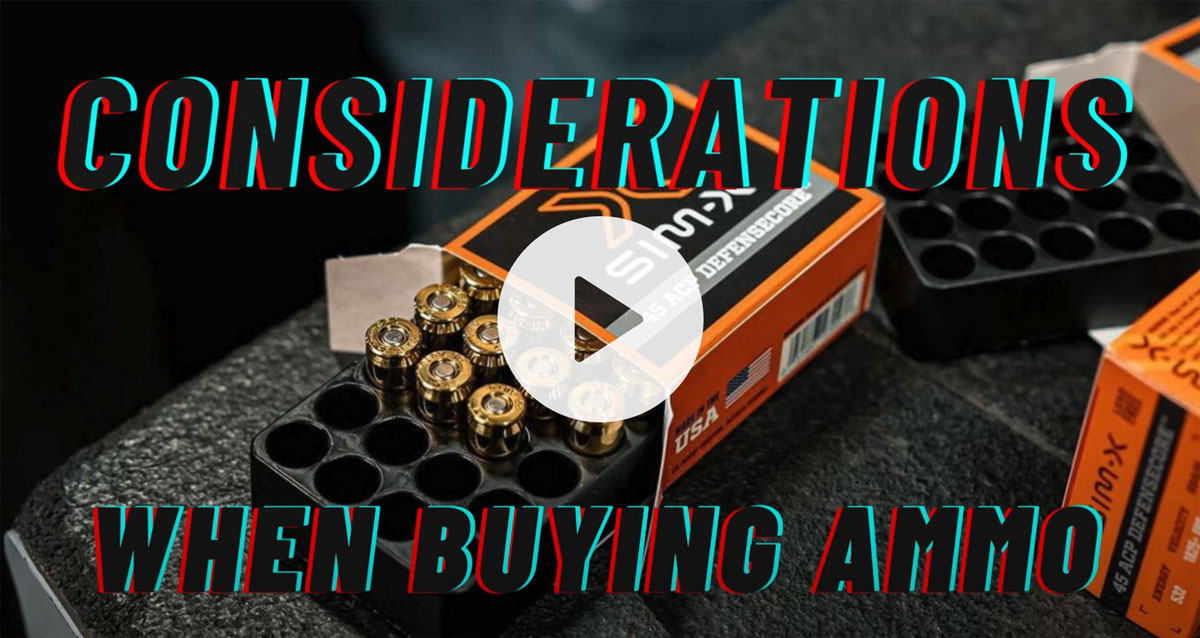When you purchase your first box of ammunition it will be somewhat of a benign event. On the flip side, when you purchase your first case of ammunition it will be exhilarating. There are so many options available today, it can be difficult to know what the best or right ammunition is to buy. When you start out buying ammunition, it is nice to have a system or plan in place. Here are four topics to consider the next time you purchase ammunition: type, brand, quantity and factory condition. While there can be many other considerations, these four will get you started on creating your own system.
Purchase Ammo Legally
It’s important you know what you are getting yourself into regarding the legalities of purchasing ammunition. Each state has their own laws governing the sale of ammunition. A good place to start is with a local gun store—ask plenty of questions. Resources online are another option. At times they can create more questions than they provide answers. Even buying ammunition online can pose some challenges or extra steps depending on the state. Then there is the type of ammunition you intend on purchasing. Some states prohibit certain types of ammunition and there can be hefty penalties for violations. The best course of action is to be as informed as reasonably possible.
Types of Ammunition
Ammunition can come in several different types, the two most popular being practice and defensive. You may at some point discover a need for specialized ammunition, such as frangible or even tracers, but practice and defensive are a good place to start. What makes defensive ammunition special? Most defensive ammunition is made of a jacketed hollow point design or JHP. The core—commonly made of lead or other soft type material—is an open cavity surrounded by a thin layer or jacket that works in concert with the core during expansion. When the projectile strikes an object, the cavity is filled, causing the core to expand and peel open like rose petals. The purpose behind this action is to create greater surface area which helps to destroy more tissue. In a self-defense situation, this can hurry or quicken the process of stopping a deadly force encounter. These rounds are made in smaller batches at the factory with increased quality control processes. One advantage to the smaller batches is some JHP are incredibly accurate outside of match grade ammunition. Due to the added production complexities and being manufactured in smaller batches, defensive ammunition is more expensive, which will make bargain shopping challenging.
Practice ammunition is primarily full metal jacket or FMJ-type rounds. This means there is a lead core surrounded by a jacket that many times fully encapsulates the core. There is not much to this type of round, which is why there are so many options available. Factories can produce FMJ-type rounds in significantly higher volume than defensive ammunition. As a result, the consumer can reap the benefits in both availability and quantity. When it comes to terminal performance—the effects of the projectile on the target—there are four main concerns. It first must go bang and bang every time you pull the trigger; it then needs to hit the target, what you are trying to stop. Then it must penetrate to reach the vital organs and lastly, it should expand to destroy more tissue. FMJ-type rounds will do everything the JHP rounds do except for expansion. While not ideal for self-defense, you can use FMJ-type rounds if nothing else is available.
What Ammunition Brand Is Best?

How Much Ammo Should You Buy?
Quantity will vary for both types and brands. Defensive ammunition usually comes in smaller quantities per box, but the price is more expensive per round. Practice ammunition can come in 50-round boxes or even loose in a case. There are also mega-blocks which are nothing more than 2–4 trays of 50 rounds in a single box. To be honest, these are often overlooked gems in the ammunition purchasing world. The more ammunition per individual item, the less expensive at a price-per-round condition. A box of 50 FMJ rounds may cost you $18, which comes out to a price of $0.36 per round. However, the same type and brand of ammunition at 1,000 rounds will cost you $254 or $0.25 per round. When possible, buying in bulk does have a strong appeal when you plan on shooting frequently. I like buying my practice ammunition in bulk and when I can find good deals, I typically take the opportunity to invest. Defensive ammunition is more expensive to buy in bulk, so I look for better deals at a per-box price. I try to buy at least 2–3 boxes of defensive ammunition per year. This gives me plenty to replace my existing inventory that I carry daily, while also allowing me to zero any red-dot optic or confirm my zero as part of my routine maintenance.
What Does Factory Condition Mean?
Condition has to do with the manufacturing process. There are four components to handgun ammunition: projectile, powder, case and primer. First is factory new which means no component has been fired previously. It is by far the most reliable and safest type of ammunition to use. Next is factory reloaded which means one or more components, usually the case, has been fired at least once. A couple of reliable brands that have factory reloaded options are cheaper than their factory new options. It can be a good investment if you cannot find factory new at the cheaper price. After that is reloaded ammunition which means one or more components was reloaded from somewhere other than a factory. These types of rounds can be risky and something to avoid unless you are really in a pickle. Reloaded ammunition from somewhere other than a factory can increase the risk of a catastrophic incident. This happens mostly because of excessive powder charge which creates enough overpressure to cause the firearm’s structural integrity to be compromised.
Decide What’s Best for You
Buying ammunition can be frustrating, even intimidating to some. When buying ammunition, whether online or in-person, consider the type of ammunition you intend on purchasing. Are you looking for practice ammunition where you have more options or do you need a small amount of defensive ammunition? Brands of ammunition are more important when it comes to defensive ammunition. Those who have been manufacturing for a long time have an advantage, but their inability to constantly innovate can also give the smaller manufacturers a greater advantage. There is something to be said about buying in bulk, especially ammunition. How the ammunition is packaged helps you understand the price per round. Lastly is the condition of the ammunition. Defensive ammunition should always be factory new. Factory reloaded ammunition can be a good value to the savvy buyer at times. Keep these four considerations in mind to help navigate the ammunition buying scene and create your own system.


